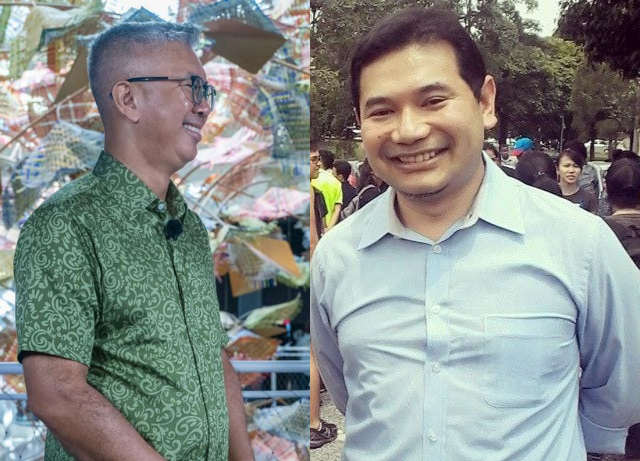
Opinion: From Breakthrough to Big League: Rafizi and Zafrul’s Political Hustle Same Game, Different Playbook?
13 Aug 2025 • 10:00 AM MYT

Annan Vaithegi
From sharing insights to creating content that connects and inspires

Image Source: Tengku Zafrul & Rafizi Ramli
Who would you trust more to lead Malaysia’s economy the reformist with a history of shaking the system, or the banker who’s been part of the system all along? It’s a question that says as much about us, the voters, as it does about Rafizi Ramli and Tengku Zafrul Abdul Aziz.
In Malaysian politics, there are many roads to Putrajaya. Some start at the grassroots, where you earn your stripes sweating it out with the rakyat. Others begin in carpeted boardrooms, where handshakes are firm, and the coffee is served in porcelain, not polystyrene.
Rafizi Ramli and Tengku Zafrul Abdul Aziz represent two ends of that spectrum. Both now sit in the big league high-ranking Cabinet positions, headline-making portfolios, and a fan club as well as a critics’ club. But how they got here? That’s where the plot twists begin.
Like roti canai and sushi both are edible, both are enjoyed by Malaysians, but one is flipped hot on a greasy griddle while the other is sliced with precision in a minimalist kitchen.
The Reformist Who Thrived in the Trenches
Rafizi’s journey into politics is stitched into the fabric of Reformasi. While many his age were focused on climbing corporate ladders, Rafizi was climbing the stage at ceramahs, often armed with nothing but slides, statistics, and a well-placed political punchline. His 2012 NFC “cow-condo” exposé became a defining moment not only exposing alleged misuse of public funds but showing Malaysians that here was a politician unafraid to mix numbers with narrative.
It’s not easy turning complex financial misappropriation into kedai kopi conversation, but Rafizi did it. He mastered the art of political storytelling, where a budget spreadsheet became a moral lesson and every PowerPoint slide felt like a courtroom exhibit.
Rafizi’s style has always been rooted in conviction politics not just chasing power for its own sake, but positioning himself as the rakyat’s watchdog. In a country where whistleblowers often get silenced faster than they get thanked, that’s no small feat. It earned him trust among reform-minded Malaysians, even if it also earned him a few court charges along the way.
The Banker Who Walked Into the Cabinet
Tengku Zafrul’s journey was… a little more air-conditioned. While Rafizi was sweating under ceramah tents, Zafrul was negotiating in boardrooms with suits that cost more than a backbencher’s monthly allowance. He was a star in corporate finance Kenanga, CIMB, Maybank before making the great leap from CEO to Cabinet minister.
When the pandemic hit in 2020 and the political ground was shaking, Zafrul was appointed Finance Minister. For some, this was a refreshing change: finally, someone who could read a balance sheet without squinting. For others, it was another sign that in Malaysia, political power isn’t always earned at the ballot box sometimes it’s granted through the right networks, the right titles, or, cynics would say, the right last name.
Zafrul has always carried himself as a technocrat his language peppered with market terms, investor confidence, fiscal discipline. His is the style of governance that assumes efficiency is more important than emotion, and that steady hands will win more trust than fiery speeches.
The Malaysian Playbook Problem
Here’s the twist: despite their very different origins, both men now have to play by the same Malaysian political rulebook one that is neither entirely about competence nor purely about popularity.
Our politics is a game of survival wrapped in a performance. You can be the smartest policy mind in the room, but if you can’t navigate party factions, you won’t last. You can be a grassroots hero, but if you can’t deliver economic results, you’ll get replaced.
In this way, Rafizi and Zafrul are learning the same lesson: once you’re in the Cabinet, the scoreboard is measured in trust, not titles. You can’t live forever off past achievements.
Different Hustles, Same League
Rafizi plays politics like a pasar malam hawker loud when necessary, approachable, and able to package serious goods into a form the public can take home. He thrives on connection, on the energy of the crowd, on the feeling that he’s one step ahead in the conversation.
Zafrul plays it like a corporate tender proposals neatly packaged, presented in a boardroom, approved with nods instead of applause. He’s less likely to shout over the noise, more likely to simply wait until the room quiets down and speak calmly.
These are not just stylistic choices; they’re survival strategies shaped by where each man came from.
Public Perceptions and Political Reality
Ask the average Malaysian about Rafizi, and you’ll likely hear about his Reformasi roots, his whistleblowing streak, and his knack for explaining policies in plain language. He’s seen as the idealist who’s not afraid to ruffle feathers. But the flip side? Some say he’s more comfortable as an opposition figure than as a governing minister, where compromise is unavoidable.
Ask about Zafrul, and you’ll hear about his corporate track record, his cool demeanour, and his clean, suit-and-tie image. To his supporters, that makes him a steady hand in turbulent times. To his critics, it means he’s disconnected from the everyday struggles of the rakyat.
The Big League Test
Both men are now in the same Cabinet jungle, where alliances shift overnight and the ground can collapse under your feet without warning. Malaysian voters are not known for patience one wrong policy, one tone-deaf remark, and the WhatsApp groups will light up like it’s Hari Raya.
Cabinet politics is not a gentleman’s game. It’s more like sepak takraw you can look graceful in the air, but you’re only one bad landing away from injury. Here, political capital can vanish faster than a hot goreng pisang at the pasar Ramadan.
Why This Matters for Malaysia
The story of Rafizi and Zafrul is not just about two personalities. It’s a mirror for Malaysia’s larger debate: do we value leaders who rise from the people, who understand the struggles from the ground up? Or do we prefer those with technical expertise, who can navigate the complex machinery of global finance and governance?
In truth, we need both but our political culture often pits them against each other, as if heart and head can’t sit in the same room.
Closing Whistle
Whether you’re Rafizi with your Reformasi scars or Zafrul with your corporate polish, once you’re in the big league, the rules change. It’s no longer enough to have been the hero of yesterday’s story. You have to prove, day after day, that you can still play, still score, still matter.
Because in Malaysian politics, the rakyat’s cheer can turn into a boo before the final whistle blows. And when that happens, it doesn’t matter how you entered the stadium only whether you’re still on the field when the game ends.
So, who really makes the better economic leader for Malaysia? The truth is, it depends on what we think leadership means. If you want a fighter who’ll challenge the status quo and speak uncomfortable truths, you’ll lean Rafizi. If you want a calm hand who reassures investors and plays by the numbers, you’ll lean Zafrul. But here’s the uncomfortable twist in the Malaysia we have today, neither style alone is enough. The economy needs the fighter’s courage and the banker’s discipline. The question is: can either man, or any leader, truly be both?
Annan Vaithegi – Political analyst who reads between the headlines and the handshakes.
No comments:
Post a Comment